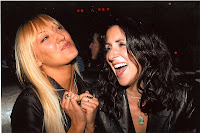
When it comes to the writing life, which is both so disconnected from the (mind-numbingly boring) routines of the 9-5 world, and which also seems so dependent on subjective judgments of who’s good and who knows who, we can all use a champion.
So I thought I’d talk about one of mine.
My good friend, mentor and lunch buddy Marianne Gingher (who is also the author of an award-winning novel and short story collection, memoirs, and a forthcoming essay collection about the writing life) decided that I was the one to cover for her when she took sabbatical this spring from UNC Chapel Hill, where she has previously served as the creative writing director and where people seem to get really excited during ACC basketball, though this was a close-but-not-quite year.
With so little to keep me busy these days—two kids, writing, book promotion, various freelance projects, and helping my husband out with his software design business—I naturally wasn’t worried at all about teaching two intro fiction courses at UNC Chapel Hill an hour’s commute away.
I did the math. Two classes a week, 28 classes, 56 hours in the car. I was planning to get through an audio book or few. But I didn’t listen to even one. Why? Because I could sit in silence for an hour in the car. Silence. For an hour, each way. Did I mention kids? On Highway 54, which winds through farmland, I drove past a house that looked close to collapse yet someone had taken the time to paint the window frames a bright pink. This was the way I felt—listing, yet still flecked with color here and there, holding up in spite of the inevitable weight of things.
On Tuesday and Thursday mornings this spring, I navigated my car into some new world, completely different from the one I normally inhabit. I parked in a lot and took a bus to campus. The driver called a greeting to the students as they boarded. Some of them mumbled a response. Many didn’t, but the bus driver persisted, morning after morning. Sometimes I wanted to stand up and say, “Hey, someone said good morning to you! Don’t you know that’s a gift?”
But they didn’t, because they don’t know what it’s like to disappear yet. Most of them have come from homes where their every move was monitored, as mine was. They want to disappear! They haven’t encountered the deep disinterest of the world beyond campus. (Not to say that the world’s deep disinterest doesn’t yield some good material.)
But this was why I was worried, actually, about teaching college students. Not because of the commute, or how I would fit the work into my life. I mean, I love teaching. But would I jive with these people, who maybe didn’t understand how hungry you have to be?
Of course, they surprised me. Many, many of them had both talent and the will to work. Sometimes I saw the glimmer in a line (that bright defiant paint); sometimes it was an understanding of story which I wish I’d possessed then—and which I was thrilled to encounter. Nothing better than reading an assignment that turned into a story that makes you want to know what happens next.
I thought I would plow through audio books in my car and secretly hate my students. I guess I believed I’d already collapsed, given in.
But Marianne Gingher expected something else from me, which is what a champion is supposed to do.
Writing is a lonely business. You need people to look out for you, and you need to do some looking out. Who else has shown me this? Julianna Baggott, Julie Funderburk, Lynn York, Andrea Selch, Mary Ellis Gibson, to name a very few. Dangerous territory, naming names, because of all those you might leave out—but the first two are enormously talented writers whom I was lucky to meet in grad school and the remaining three comprise the writing group that was willing to take me in nearly three years ago..
I’ve often thought it would be nice if we could have a system of sorts for writers. Apprentice, assistant, associate, senior, etc. Wouldn’t that be nice? Pay scales and health insurance and such? We could even go on strike occasionally and hit the beach!
But writers aren’t team players. We don’t go for hierarchy unless it's working in our favor. Nevertheless, we’ll just have to link arms where we can, look for the door, guide each other toward it.
Quinn Dalton is the author of a novel, High Strung, and two story collections, Bulletproof Girl and Stories from the Afterlife. Stories and essays have appeared in literary magazines such as One Story, Verb and Glimmer Train, and in anthologies such as New Stories from the South: The Year's Best. Dalton lives in Greensboro, NC.



















